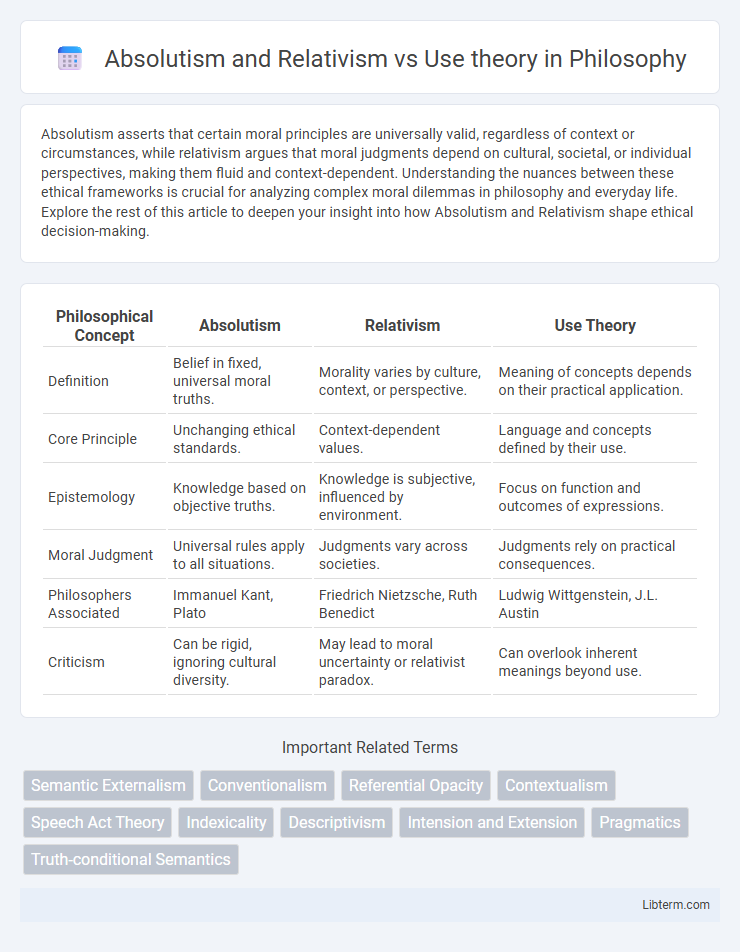Absolutism asserts that certain moral principles are universally valid, regardless of context or circumstances, while relativism argues that moral judgments depend on cultural, societal, or individual perspectives, making them fluid and context-dependent. Understanding the nuances between these ethical frameworks is crucial for analyzing complex moral dilemmas in philosophy and everyday life. Explore the rest of this article to deepen your insight into how Absolutism and Relativism shape ethical decision-making.
Table of Comparison
| Philosophical Concept | Absolutism | Relativism | Use Theory |
|---|---|---|---|
| Definition | Belief in fixed, universal moral truths. | Morality varies by culture, context, or perspective. | Meaning of concepts depends on their practical application. |
| Core Principle | Unchanging ethical standards. | Context-dependent values. | Language and concepts defined by their use. |
| Epistemology | Knowledge based on objective truths. | Knowledge is subjective, influenced by environment. | Focus on function and outcomes of expressions. |
| Moral Judgment | Universal rules apply to all situations. | Judgments vary across societies. | Judgments rely on practical consequences. |
| Philosophers Associated | Immanuel Kant, Plato | Friedrich Nietzsche, Ruth Benedict | Ludwig Wittgenstein, J.L. Austin |
| Criticism | Can be rigid, ignoring cultural diversity. | May lead to moral uncertainty or relativist paradox. | Can overlook inherent meanings beyond use. |
Introduction to Absolutism, Relativism, and Use Theory
Absolutism asserts that certain moral principles are universally valid regardless of context, establishing fixed ethical standards. Relativism challenges this by emphasizing the influence of cultural, situational, or individual perspectives on moral judgments, rejecting universal norms. Use Theory, rooted in philosophical pragmatism, evaluates truth and meaning based on practical consequences and applications, bridging the dichotomy between fixed rules and contextual interpretation.
Fundamental Principles of Absolutism
Absolutism upholds unchanging, universal moral laws that apply to all individuals regardless of context, emphasizing objective truths rooted in fundamental ethical principles. Relativism challenges these fixed standards by asserting that moral judgments depend on cultural, societal, or individual perspectives, making ethical norms fluid and context-dependent. The Use theory evaluates concepts based on their practical function in language, contrasting with Absolutism's pursuit of absolute moral truths.
Key Concepts of Relativism in Ethics and Epistemology
Relativism in ethics and epistemology emphasizes that moral truths and knowledge claims are not absolute but dependent on cultural, historical, or personal contexts. Key concepts include cultural relativism, which asserts that ethical norms vary between societies, and epistemic relativism, which holds that what counts as knowledge is contingent on specific frameworks or paradigms. This contrasts with absolutism, which upholds unchanging universal principles, and the use theory, which evaluates concepts and beliefs based on their practical applications and effects in various contexts.
Core Tenets of Use Theory in Language and Meaning
Use theory in language and meaning posits that the meaning of a word is determined by its use within a particular linguistic community, emphasizing practical application over fixed definitions. Unlike absolutism, which asserts fixed, immutable meanings, and relativism, which holds that meanings vary entirely based on individual perspectives, use theory grounds semantic understanding in social practice and contextual usage. This approach highlights that language evolves through habitual use, making meaning inherently dynamic and dependent on communicative functions.
Comparing Moral Absolutism and Use Theory
Moral absolutism asserts that certain ethical principles are universally valid and unchanging, providing clear, objective standards for right and wrong regardless of context or consequences. In contrast, use theory evaluates the morality of actions based on their practical effects and utility, emphasizing outcomes and situational factors over fixed rules. Comparing these frameworks highlights a fundamental tension between rigid, principle-based ethics and flexible, consequence-oriented moral reasoning.
Relativism and Use Theory: Points of Intersection
Relativism and Use Theory both challenge absolute interpretations by emphasizing context and practical application in understanding meaning. Relativism asserts that truth and moral values depend on cultural, linguistic, or individual perspectives, while Use Theory highlights how meaning arises from the actual use of language within specific social practices. Their intersection lies in rejecting fixed meanings in favor of flexible, context-dependent interpretations shaped by lived experience and communicative function.
Practical Implications: Absolutism vs. Relativism in Use Theory
In Use Theory, Absolutism posits fixed linguistic rules and meanings, ensuring stable communication and consistent interpretation across contexts, which aids in legal and scientific discourse. Relativism challenges this by emphasizing context-dependent usage and fluid meanings, promoting adaptability but risking ambiguity and miscommunication in practical applications. The practical implication is a trade-off between predictable language use under Absolutism and flexible, context-sensitive interpretation under Relativism, influencing how institutions, like courts or educational systems, standardize language policies.
Criticisms of Absolutism, Relativism, and Use Theory
Absolutism faces criticism for its rigid application of universal moral rules, often ignoring cultural diversity and situational nuances, which can lead to ethical insensitivity. Relativism is challenged for its potential to justify harmful practices by relying on subjective cultural or individual standards, undermining objective moral accountability. Use theory is criticized for its ambiguity in determining whose interests truly count, sometimes leading to conflicting interpretations of fairness and justice in practical application.
Contemporary Examples and Applications
Absolutism asserts universal moral principles that apply regardless of context, exemplified by international human rights laws prohibiting torture under any circumstance, while Relativism emphasizes cultural and situational ethics, as seen in differing attitudes toward freedom of speech across countries. The Use theory, which analyzes language based on its practical application, is evident in contemporary debates over social media content moderation, where platform policies reflect community standards rather than absolute norms. This contrast highlights the tension between fixed ethical codes and context-dependent practices in global governance and digital communication.
Conclusion: Integrating Perspectives for Deeper Understanding
Integrating absolutism and relativism with use theory reveals a nuanced framework that balances universal moral principles and context-dependent applications. Absolutism provides consistent ethical standards, while relativism acknowledges cultural and situational diversity, allowing use theory to guide practical decision-making grounded in real-world contexts. This synthesis enhances moral reasoning by combining stable values with flexibility and practical relevance.
Absolutism and Relativism Infographic

 libterm.com
libterm.com